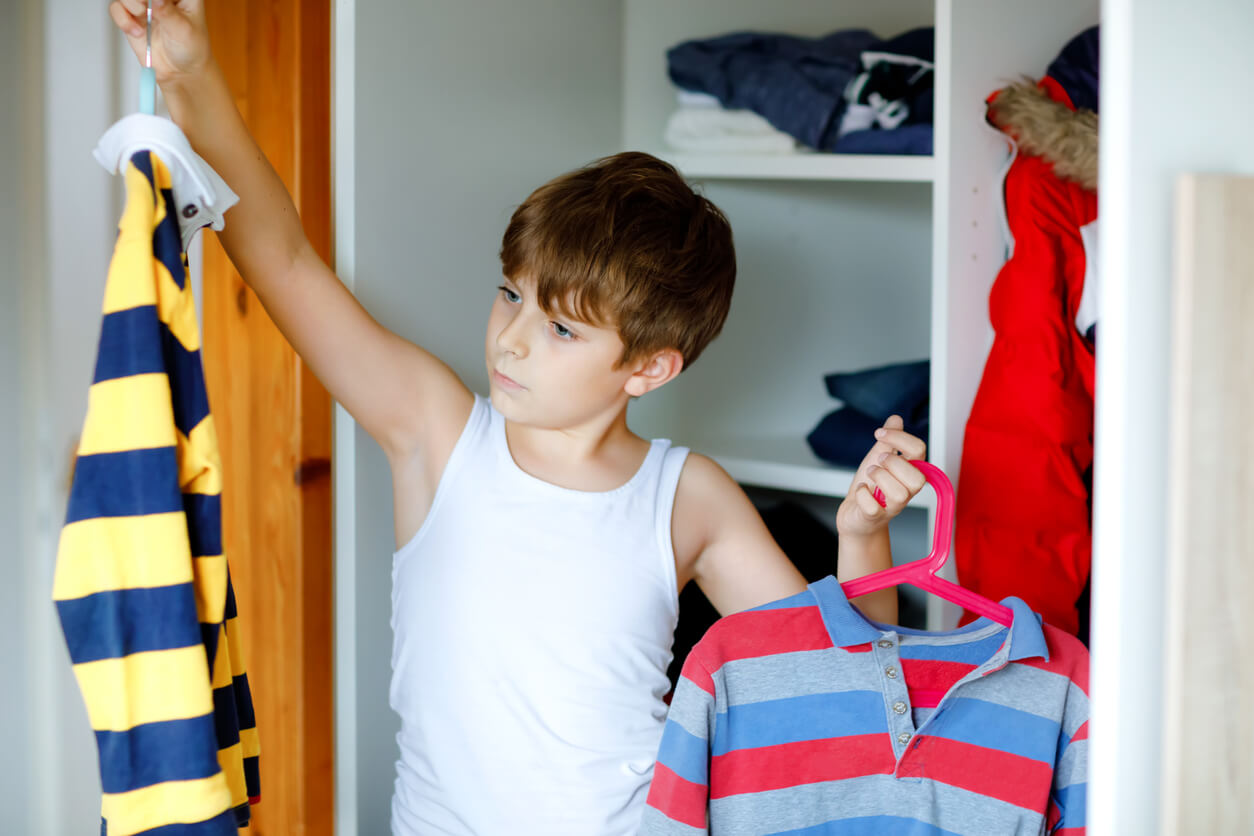How to Foster Critical Thinking in Our Children


Written and verified by the psychologist Sharon Capeluto
Critical thinking is being able to reflect on facts and draw one’s own conclusions. In other words, it’s about analyzing and evaluating the information we receive and being able to question it. This is a skill that has a positive impact on all aspects of a person’s life, from work or academic to social and relational. So, how can we foster critical thinking in our children?
Critical thinking contributes to having an independent and autonomous personality. At the same time, it’s a great ally when making decisions. For this reason, stimulating critical thinking in children is fundamental for their development.
Why is it so important to foster critical thinking?
This type of thinking helps to analyze reality in a more objective way, from a broad and flexible point of view. Contrary to memorization, critical thinking allows a person to reach an opinion or conclusion on their own. Therefore, a child capable of questioning the information they receive will be better able to process what they learn and will be more prepared to face any adversity that life presents.
It’s a significant skill that can be used in practically any daily situation, from how to solve a mathematical exercise to how to resolve a conflict with a friend or how to put together a puzzle.
Tips to foster critical thinking in children
Those who are critical thinkers have good character and are not easily fooled. This means that they are difficult to influence and manipulate people. Next, we bring you some recommendations to stimulate your children’s.

Assuming a reflective stance
Remember that children learn by example. Therefore, with adults able to reach conclusions by interpreting and analyzing information, it’ll be more feasible for children to adopt this active and reflective stance.
When a problematic situation arises in the home, choose to consider several alternative ways to solve it and involve your children. This way, you’ll convey that there’s no single valid way of doing things, but that there’s always the possibility of considering different options. It’s important to question even what seems obvious and indisputable.
Stimulate creativity
Proposing playful activities that stimulate curiosity and creativity is an excellent idea to enhance critical thinking. Encouraging children to explore and give free rein to ideas, no matter how crazy they may seem, helps develop more complex cognition.
Drawing a picture, writing a story, creating a play with dolls, or making a collage are all valuable activities. In this way, children can develop rich thinking that involves associating known concepts, creating new ones, and investigating possible directions to solve a problem.
Invite reflection
Generating moments of debate about situations that occur at home, at school, or in the country is an interesting idea for children to acquire the habit of questioning. Talk about current issues with them, but always adapt to their level of understanding and interests.
In addition, taking an interest in their opinions and listening to them without judgment is essential for children to discover themselves. In this regard, it’s essential to enable a free and respectful dialogue with tolerance for differences. We must value the diversity of opinions, even when it comes to our children.

Don’t give them all the answers
If we want our children to have strong critical thinking skills, it’s important not to give them all the answers. A better approach is to guide them through questions that allow them to reach conclusions that they themselves have drawn. At the same time, when their knowledge isn’t enough to clarify their confusions, we can motivate them to investigate and accompany them in the process.
Offer a broad view from home
The development of critical thinking in children is possible when they share environments with other people who are capable of analyzing and questioning the information given. On the other hand, when their families have strictly rigid beliefs, it’s much more complex to adopt a critical stance on life and, therefore, make better decisions.
Therefore, the primary recommendation is to offer your children a curious and analytical look at what’s happening in the world. At the same time, respect for diversity of opinions and perspectives should be instilled.
Critical thinking is being able to reflect on facts and draw one’s own conclusions. In other words, it’s about analyzing and evaluating the information we receive and being able to question it. This is a skill that has a positive impact on all aspects of a person’s life, from work or academic to social and relational. So, how can we foster critical thinking in our children?
Critical thinking contributes to having an independent and autonomous personality. At the same time, it’s a great ally when making decisions. For this reason, stimulating critical thinking in children is fundamental for their development.
Why is it so important to foster critical thinking?
This type of thinking helps to analyze reality in a more objective way, from a broad and flexible point of view. Contrary to memorization, critical thinking allows a person to reach an opinion or conclusion on their own. Therefore, a child capable of questioning the information they receive will be better able to process what they learn and will be more prepared to face any adversity that life presents.
It’s a significant skill that can be used in practically any daily situation, from how to solve a mathematical exercise to how to resolve a conflict with a friend or how to put together a puzzle.
Tips to foster critical thinking in children
Those who are critical thinkers have good character and are not easily fooled. This means that they are difficult to influence and manipulate people. Next, we bring you some recommendations to stimulate your children’s.

Assuming a reflective stance
Remember that children learn by example. Therefore, with adults able to reach conclusions by interpreting and analyzing information, it’ll be more feasible for children to adopt this active and reflective stance.
When a problematic situation arises in the home, choose to consider several alternative ways to solve it and involve your children. This way, you’ll convey that there’s no single valid way of doing things, but that there’s always the possibility of considering different options. It’s important to question even what seems obvious and indisputable.
Stimulate creativity
Proposing playful activities that stimulate curiosity and creativity is an excellent idea to enhance critical thinking. Encouraging children to explore and give free rein to ideas, no matter how crazy they may seem, helps develop more complex cognition.
Drawing a picture, writing a story, creating a play with dolls, or making a collage are all valuable activities. In this way, children can develop rich thinking that involves associating known concepts, creating new ones, and investigating possible directions to solve a problem.
Invite reflection
Generating moments of debate about situations that occur at home, at school, or in the country is an interesting idea for children to acquire the habit of questioning. Talk about current issues with them, but always adapt to their level of understanding and interests.
In addition, taking an interest in their opinions and listening to them without judgment is essential for children to discover themselves. In this regard, it’s essential to enable a free and respectful dialogue with tolerance for differences. We must value the diversity of opinions, even when it comes to our children.

Don’t give them all the answers
If we want our children to have strong critical thinking skills, it’s important not to give them all the answers. A better approach is to guide them through questions that allow them to reach conclusions that they themselves have drawn. At the same time, when their knowledge isn’t enough to clarify their confusions, we can motivate them to investigate and accompany them in the process.
Offer a broad view from home
The development of critical thinking in children is possible when they share environments with other people who are capable of analyzing and questioning the information given. On the other hand, when their families have strictly rigid beliefs, it’s much more complex to adopt a critical stance on life and, therefore, make better decisions.
Therefore, the primary recommendation is to offer your children a curious and analytical look at what’s happening in the world. At the same time, respect for diversity of opinions and perspectives should be instilled.
All cited sources were thoroughly reviewed by our team to ensure their quality, reliability, currency, and validity. The bibliography of this article was considered reliable and of academic or scientific accuracy.
- Alzate, O. E. T. (2012). La argumentación como constituyente del pensamiento crítico en niños. Hallazgos, 9(17), 211-233.
- Ito, K. K. K. J. C. (2019). Desarrollo del pensamiento crítico en niños de educación primaria. Revista de Pensamiento Crítico Aymara, 1(1), 47-64.
- Linares, W. (2022). Estrategias lúdicas para el pensamiento crítico-creativo en niños de cinco años. Revista Innova Educación, 4(3), 168-184.
This text is provided for informational purposes only and does not replace consultation with a professional. If in doubt, consult your specialist.








